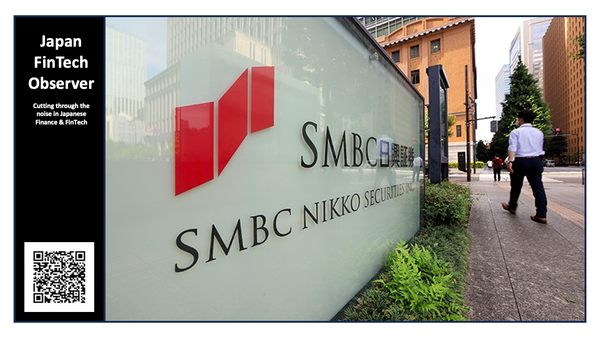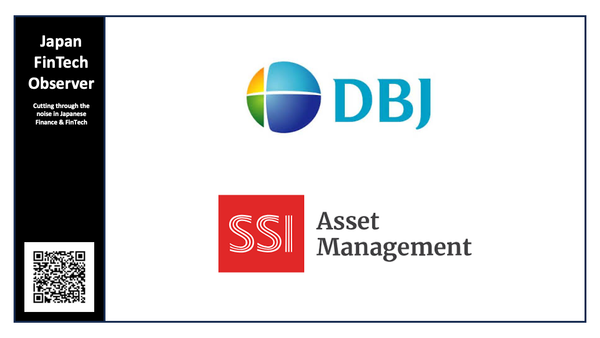Japan FinTech Observer #121

Welcome to the one hundred twenty-first edition of the Japan FinTech Observer.
In Japan’s Upper House Elections, the ruling Liberal Democratic Party along with partner New Komeito lost its majority in the chamber. This marks the first since 1955 that the LDP-led government has fallen below a majority in both the lower and upper house, potentially increasing political instability in Japan. The latest seat count by NHK had LDP and Komeito combining for 47 seats in this election. If upheld, this seems to have fallen into the higher range indicated in initial exit polls (32-51 seats), but is overall still a repudiation for Prime Minister Ishiba.

The PM, though, has expressed his intention to remain in his position. Therefore, a minority government of the current LDP-Komeito coalition is likely to continue, as there are open questions who would dare to follow Ishiba even if the LDP leadership convinced him to resign. In the game for power, it would be wise to let him be ineffective a little longer. However, cooperation with opposition parties on a bill by bill basis is likely to become even more crucial for passing legislation, suggesting a likely expansionary bias in fiscal policy ahead.
Here is what we are going to cover this week:
- Insurance: Neo First Life Insurance has entered into a business partnership with Car Seven DigiField; Tokio Marine dR (TdR) and Corpy & Co. will begin a strategic business partnership aimed at supporting the promotion of AI utilization by Japanese companies; the FDUA publishes an updated version of the "Financial Generative AI Guideline 2025"
- Banking: Sumitomo Mitsui Financial Group is reportedly considering raising its stake in Indian lender YES BANK to up to 25%; Olive launches new "Money Assist" feature; AEON Credit Service reported a 14.9% year-on-year growth in revenue in the first fiscal quarter; the Daiwa Research Institute analyzes cross-prefectural restructuring of regional banks
- Payments: PayPay has reached 70m registered users; the Bank of Japan has published an official English translation of its progress report on its CBDC experiments & pilot program; Digital Garage group companies have made several new product announcements during the first half of July
- Capital Markets: the 20-year JGB Futures trading volume has reached record levels; as the Bank of Japan has completed the sale of single stocks, the focus is shifting towards an exit strategy for the holdings of exchange-traded funds (ETFs); the FSA has proposed revisions to its Supervisory Guidelines for Internet Trading; the Study Group on T+1 Transition has published its interim report
- The Last Word: Japan's New "Early Business Turnaround Act"
Insurance
- Neo First Life Insurance has entered into a business partnership with Car Seven DigiField, which operates a used car buying and selling franchise chain; through this business partnership, Neo First Life Insurance will begin providing various insurance services and information, including an "insurance diagnosis" tool that recommends optimal insurance product types based on values and lifestyles, primarily targeting Car Seven's customers who are experiencing life events or considering reviewing their household expenses in connection with buying or selling used cars; Neo First Life Insurance aims to support expanding Car Seven customers' "choices" and provide neutral and practical information to resolve customers' life anxieties
- Tokio Marine dR (TdR) and Corpy & Co. will begin a strategic business partnership aimed at supporting the promotion of AI utilization by Japanese companies; through this partnership, TdR's AI governance-related expertise will be combined with Corpy's advanced AI technology to contribute to solving challenges that companies face in AI development, provision, and utilization; based in Japan and France, Corpy is an AI startup spun off from the University of Tokyo and French Inria, with the mission to "save lives and expand equality through cutting-edge AI technology;" the company develops services aimed at AI implementation in mission-critical domains where failure is not permitted
- In related news, the FDUA publishes an updated version of the "Financial Generative AI Guideline 2025": the "Guidelines for the Use of Generative AI in Financial Institutions" is a comprehensive framework designed to help Japanese financial institutions navigate the rapidly evolving landscape of Generative AI; version 1.1 represents a significant update to the initial release, incorporating a year's worth of practical experience, industry feedback, and rapid technological advancements, including the rise of AI Agents; the guideline, developed by a diverse group of experts from finance, IT, law, and consulting, aims to provide a balanced approach—enabling institutions to mitigate risks while proactively harnessing AI for business innovation and growth; it is positioned not merely as a set of rules but as a "first step" in a continuous, collaborative journey for the entire industry
Banking
- Sumitomo Mitsui Financial Group is reportedly considering raising its stake in Indian lender YES BANK to up to 25%
- Olive launches new "Money Assist" feature, a service that allows customers who have Olive Flexible Pay Credit Mode to borrow within a loan limit of 50,000 yen multiple times, with no fees and no interest; repayment is made in a single payment the month following the month of use; the service can be used entirely through smartphones from application to borrowing and repayment, with funds deposited into the Olive account; additionally, as an optional feature of "Money Assist," a "Backup Function" is available that automatically borrows from a card loan facility (18.0% interest rate) when there are insufficient account funds during payment deductions for Olive Flexible Pay Credit Mode or Money Assist, preventing payment delays
- AEON Credit Service reported a 14.9% year-on-year growth in revenue to MYR 599.92m in the first fiscal quarter ending 31 May 2025, compared to MYR 522.26m in the preceding year; the Group recorded a 13.9% growth in total transaction and financing volume, reaching MYR 2.25bn in the first quarter, up from MYR 1.98bn in the prior year period; this growth was underpinned by AEON Credit’s continued strategic expansion into the middle-income segment and targeted marketing campaigns have improved both the Payment Business and Personal Financing with growth of 22% and 23% respectively compared to the first quarter last year
- In a recently published paper titled "Cross-Prefectural Restructuring of Regional Banks: The Reorganization of Local Economic Zones at its Foundation", the Daiwa Institute of Research provides a detailed analysis of the ongoing restructuring of Japan's regional banking sector, and argues that these realignments are fundamentally driven by the reorganization of underlying local and regional economic zones; the paper posits that the consolidation of regional banks, particularly the significant reduction in the number of "second-tier regional banks," is not a random process but follows distinct patterns that mirror shifts in economic power and integration
Payments

- PayPay has reached 70m registered users
- The Bank of Japan has published an official English translation of its progress report on its CBDC experiments & pilot program, originally published in Japanese in May 2025
- Digital Garage group companies have made several new product announcements during the first half of July: (I) DG Financial Technology (DGFT) has announced the launch of initiatives integration of online and offline payments between compact automatic payment machines manufactured by AKATSUKI ELECTRIC, and DGFT's O2O terminal-free payment service “Cloud Pay REGI;" (II) DG Financial Technology (DGFT) has announced that its unified QR code payment solution “Cloud Pay” has been adopted for use in the “VPOS” series, a payment terminal for automated service machines developed by Nayax, a provider with an overwhelming global presence, having deployed more than 1.3 million cashless payment and IoT solutions worldwide; and (III) DG Business Technology (DGBT) has launched the “DGBT Security Assessment Service” for e-commerce business operators
Capital Markets

- On July 14 and 16, 2025, trading volume for mini 20-year JGB Futures reached 750 contracts (JPY 7.5 billion in face value); open interest rose to 1,565 contracts (JPY 15.65 billion in face value) on July 17, 2025; these represent the highest levels since the market’s relaunch in 2014; monthly trading volume in July reached 3,924 contracts (JPY 39.24 billion in face value) as of July 18, marking the highest level since the market’s relaunch as well; 10-year JGB futures remain the most widely used hedging tool of JPY interest rate risks; however, in April and May 2025, sharp fluctuations in the super-long-term ranges of over-the-counter (OTC) JGB and interest rate swap markets prompted market participants to reaffirm the importance of 20-year JGB Futures
- The exit strategy for the Bank of Japan's ETF holdings: as the Bank of Japan has now completed the sale of single stocks it purchased from banks as part of its financial system stabilization measures, the focus is shifting towards an exit strategy for the holdings of exchange-traded funds (ETFs) purchased under the large-scale monetary easing; for this discussion, we refer back to the "Issue Brief No. 1289," published by Japan's National Diet Library in August 2024, which provides a detailed analysis of the matter; the brief outlines the history of the BOJ's unprecedented ETF purchase program, assesses the current situation, and meticulously examines the various, and often conflicting, proposals for its resolution
- Proposed revisions to FSA Supervisory Guidelines for Internet Trading: this amendment is being made in light of the frequent cases of unauthorized access to and unauthorized trading (trading by third parties) in Internet trading services using customer information (login IDs, passwords, etc.) stolen from phishing sites disguised as securities company websites, in order to strengthen authentication methods and fraud prevention measures in Internet trading; the proposed revision represents a significant shift from providing general, example-based guidance to establishing a comprehensive, mandatory, and highly specific regulatory framework for Internet trading security; spurred by the rise in sophisticated phishing and unauthorized access attacks, the FSA is moving to mandate modern, robust security controls, enhance customer protection, and strengthen its own supervisory enforcement capabilities
- In a recently published report, the Daiwa Institute of Research (DIR) analyzes the significant increase in Tender Offer (TOB) activity in Japan from 2020 to mid-2025, highlighting a new phase in corporate strategy; the report's primary finding is the dramatic and accelerating increase in the volume of Tender Offers in Japan; the trend shows consistent growth, rising from 64 TOBs in 2020 to a record 127 in 2024, a 21% increase over 2023; the momentum is continuing to build; in the first six months of 2025 alone, 81 TOBs were launched. The report notes this is the "fastest pace ever" recorded, and if this trend continues, 2025 is on track to significantly surpass 2024's record high; this signals that the forces driving TOB activity are strengthening
- Interim report of the Study Group on T+1 Transition: regarding the settlement period for stock transactions, Japan migrated from T+3 to T+2 in July 2019, and currently settlement takes place two business days (T+2) after the transaction date (T day) when stock trading occurs; major countries and regions are implementing or considering T+1 migration; for example, North America migrated to T+1 starting in May 2024, and Europe has published a schedule for T+1 migration in 2027; it has been pointed out that shortening the settlement period for stock transactions has merits such as reducing settlement risk, improving capital efficiency and reducing collateral burden, and further streamlining and improving efficiency of settlement operations; as international implementation and consideration of T+1 stock settlement periods progress, it is necessary for market participants to begin practical examination of methods and issues for advancing T+1 migration so that Japan's securities settlement system is not left behind international standards
- The Bank of Japan has published the "Results of the Fourth Market Functioning Survey concerning Climate Change;" there has been a slight increase in the pricing of climate-related risks and opportunities in Japan's stock and corporate bond markets; however, the top priority for further progress remains increasing the number of issuers and investors who value these factors
The Last Word: Japan's New "Early Business Turnaround Act"
In a newsletter published at the end of June, Anderson Mori & Tomotsune (AMT) lawyers explained the newly enacted "Act on Procedures for Adjustment of Debts Owed by Business Operators to Financial Institutions, etc. for Facilitating Business Turnaround," referred to as the "Early Business Turnaround Act." The Act is set to be implemented within 18 months of its promulgation.
The Act introduces a groundbreaking "private restructuring by majority vote" system in Japan, creating a new, hybrid procedure that sits between fully consensual private workouts (like Turnaround ADR) and formal, public court-led proceedings (like Civil Rehabilitation or Corporate Reorganization).
The primary goal of the Act is to enable businesses in the early stages of financial distress to restructure their debts to financial institutions quickly and smoothly, thereby preventing the destruction of business value and the loss of technology and personnel. It addresses a key weakness in Japan's existing restructuring framework, where out-of-court workouts often failed due to the need for unanimous consent from all financial creditors. This new procedure allows a restructuring plan to be approved over the objections of a minority of financial creditors, provided certain conditions are met.
The procedure is designed to be non-public and confidential, even with its court-involvement component, which helps preserve the debtor's corporate value.
Please follow us to read more about Finance & FinTech in Japan, like hundreds of readers do every day. We invite you to also register for our short weekly digest, the “Japan FinTech Observer”, on LinkedIn, or here on the FinTech Observer website.
We also provide a regular short-form Japan FinTech Observer news podcast, available via its Podcast Page. Our global Finance & FinTech Podcast, “eXponential Finance” is available through its own LinkedIn newsletter, or via its Podcast Page.
Should you live in Tokyo, or just pass through, please also join our meetup. In any case, our YouTube channel and LinkedIn page are there for you as well.




